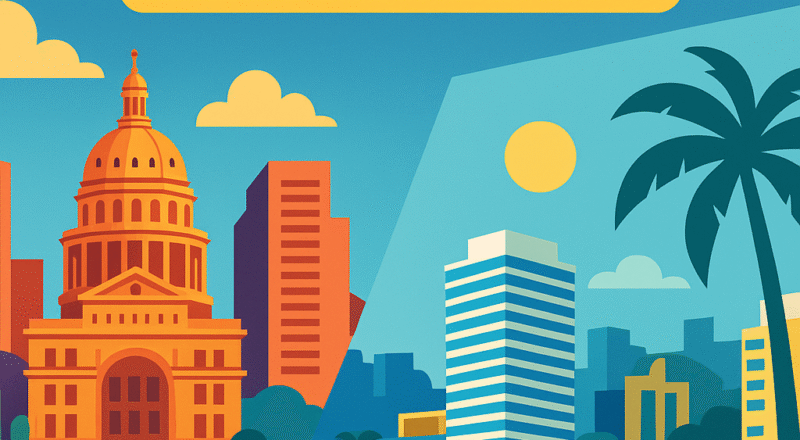For decades, Silicon Valley has been synonymous with startups, venture capital, and the beating heart of American innovation. But in 2025, the U.S. startup ecosystem looks far different than it did even a decade ago. Cities like Austin, Texas, and Miami, Florida, are emerging as powerful rivals to the Bay Area, pulling in entrepreneurs, investors, and talent in record numbers.
Are these cities the future of American innovation, or is the Silicon Valley crown still firmly in place? Let’s dive into the forces driving this shift — and what it means for startups, investors, and the future of technology.
🌆 Why Austin and Miami Are on the Rise
Austin: “Silicon Hills” Finds Its Momentum
Austin has been quietly building its reputation as a startup hub for years. Known for its live music, cultural diversity, and laid-back lifestyle, the city is now equally famous for its tech scene.
-
Major Tech Moves: In recent years, Tesla moved its headquarters to Austin, along with Oracle and countless other tech firms. This created a ripple effect, bringing suppliers, talent, and capital.
-
Talent Pool: With the University of Texas at Austin producing top engineers and the influx of workers from California, Austin has a rich and growing talent base.
-
Cost Advantage: Office rents, housing prices (though rising), and overall cost of living are still lower than San Francisco’s.
Austin’s startup ecosystem spans AI, semiconductors, gaming, and clean energy, with local accelerators like Capital Factory fueling early-stage ventures.
Miami: Crypto Capital to Startup Hub
Miami was once dismissed as a tourism hotspot with little tech relevance. But over the past five years, it has transformed into one of the most exciting startup hubs in the U.S.
-
Political Support: Mayor Francis Suarez famously tweeted “How can I help?” in response to Silicon Valley exiles seeking new opportunities. That openness translated into policy, tax benefits, and pro-business initiatives.
-
Crypto & Fintech: Miami quickly became the crypto capital of the U.S., hosting Bitcoin 2021 and attracting blockchain companies. Even as crypto markets cooled, Miami’s fintech ecosystem continued to thrive.
-
International Gateway: Positioned as a bridge to Latin America, Miami startups have unique access to markets often overlooked by Bay Area companies.
Today, Miami startups are expanding beyond crypto into healthtech, AI, logistics, and edtech.
💰 Venture Capital Is Following
Traditionally, Silicon Valley dominated venture capital, with over 40% of U.S. VC dollars invested in the Bay Area as recently as 2018. But things are shifting:
-
Austin VC Boom: Funds like Silverton Partners and LiveOak Venture Partners are scaling their portfolios. Major Bay Area firms such as Andreessen Horowitz and Sequoia have also opened Austin offices.
-
Miami Funding Surge: Miami saw record venture funding in 2024, particularly in fintech and blockchain. SoftBank’s $5 billion Latin America fund, headquartered in Miami, is a major player.
Investors are chasing startups where they emerge. And increasingly, they’re emerging outside of California.
👩💻 Startup Success Stories
Austin Startups to Watch
-
ICON — Pioneering 3D-printed homes to tackle the housing crisis.
-
Everlywell — Revolutionizing at-home health diagnostics.
-
Tesla’s Gigafactory — Not a startup, but a hub attracting countless suppliers and innovators.
Miami Startups to Watch
-
MoonPay — A crypto payments company valued in the billions.
-
Papa — A healthtech startup connecting seniors with caregivers and companionship.
-
Novo — A business banking platform challenging traditional banks.
These stories highlight how local ecosystems are producing not just small players, but global contenders.
🏡 Why Founders Are Choosing These Cities
Lifestyle & Cost
-
In Austin, founders rave about the creative vibe, food scene, and relatively affordable lifestyle compared to San Francisco.
-
In Miami, the sunny climate, ocean views, and international flair are irresistible, especially for global founders.
Taxes
-
Texas and Florida have no state income tax, an enormous draw for high-earning founders and investors.
Remote Work + Hybrid Models
While remote work reduces the importance of geography, network effects still matter. Founders want to be where other founders are. Austin and Miami now provide those communities.
🌎 Beyond Austin and Miami
It’s worth noting that other U.S. cities are also rising:
-
Denver (AI and aerospace).
-
Atlanta (fintech and diversity-driven startups).
-
Seattle (cloud and gaming).
But Austin and Miami stand out for their scale, cultural momentum, and ability to pull in capital.
⚖️ Risks and Challenges
Despite the hype, challenges remain:
-
Infrastructure: Both cities face housing shortages and traffic congestion.
-
Sustainability: Miami faces climate risks like hurricanes and sea level rise.
-
Hype Cycle: Some worry that the rise of these hubs is fueled by temporary enthusiasm rather than long-term fundamentals.
🔮 Will They Surpass Silicon Valley?
Here’s the big question: Will Austin and Miami replace Silicon Valley?
The short answer: not yet.
Silicon Valley still dominates in:
-
Deep networks of engineers, founders, and investors.
-
Proximity to Stanford, Berkeley, and top-tier research institutions.
-
Billions of dollars in entrenched venture capital.
But the monopoly is broken. For the first time in decades, startups don’t have to be in Silicon Valley to succeed. Founders can choose lifestyle, cost, and community — and still raise money, attract talent, and build billion-dollar companies.
📊 Final Thoughts
In 2025, Austin and Miami are not just alternatives — they’re legitimate centers of innovation. While Silicon Valley remains the king, its crown is no longer untouchable.
For founders, the message is clear: You can build the next unicorn from anywhere.
And right now, Austin and Miami might just be the best places to try.
